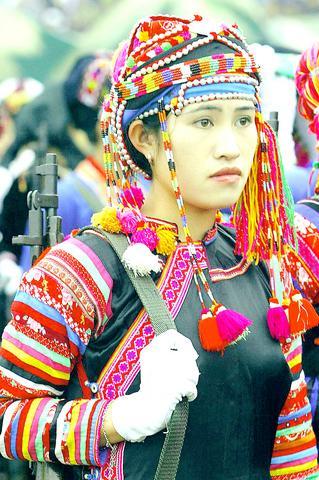French pilot Michel Marszalek fought in the battle of Dien Bien Phu half a century ago, but until this week had never set foot in the Vietnamese city which has come to epitomise the end of French rule in Indochina.
The 73-year-old veteran, who flew 115 missions over Dien Bien Phu in a C-47 Dakota, was in the mountain-ringed city to remember his own fallen comrades as it celebrated the 50th anniversary of the epic victory over the French on Friday.
"I don't recognise this place," Marszalek told reporters, referring to the hotels, restaurants, shops and Internet cafes in the city of 60,000 people.

PHOTO: AFP
All he recalled from his sorties half a century ago were glimpses of paddy fields and rustic wooden houses from the air.
Undeterred by unrelenting rain, some 15,000 people crowded Dien Bien Phu's main stadium yesterday to watch military parades, variety shows and listen to rousing speeches.
"We are sharing the joy and victory with the people of France and the peace-loving people of the world," Defense Minister Pham Van Tra told an enthusiastic crowd of mostly Vietnamese.
General Vo Nguyen Giap, whose guerrilla tactics were made famous by the Dien Bien Phu rout, sees broader significance in the event.
"It was a victory for colonized countries all over the world," the 93-year-old four star general said in March.
It was on May 7, 1954 that a rag-tag group of Viet Minh accepted the surrender from the better equipped forces led by General Christian de Castries after a bloody 56-day siege. The victory marked France's withdrawal from Indochina.
Giap estimated French forces -- who included a multinational French legion comprised of Germans, Italians, North Africans, Thai and even Vietnamese -- suffered 16,000 casualties.
The Viet Minh, a coalition of communists and nationalists, lost around 10,000.
The actual tallies will probably never be known. Other accounts, including The Last Valley by Martin Windrow published this year, note about 9,000 French forces were marched away as prisoners, and perhaps half died or disappeared.
The French have taken a low-key approach to the 50-year anniversary, with President Jacques Chirac and Ambassador Antoine Pouillieute attending a ceremony in Paris yesterday to honor the fallen.
At a seminar about the legendary battle, one of many events that Vietnam has hosted since March for the anniversary, Pouillieute focused on the lessons learned rather than the defeat.
"The profound relations between Vietnam and France have often been happy, sometimes cruel, but never mediocre," the envoy said at the seminar last month.
Two embassy officials will lay a wreath at the French monument in Dien Bien Phu, a white obelisk within a courtyard of trees that lies along a small road surrounded by houses. It was the former location of the French military hospital.
Marszalek will also lay his own wreath at the monument and is taking back soil from A1 Hill (Eliane 2) where France made its last major stand. The French gave women's names to a number of hills where they were entrenched.
While recounting stories of the battle with tears, Marszalek, accompanied by his wife who had lost her fiance at Dien Bien Phu, also paid tribute to his former enemy.
"The bravery that these people showed to defend their country is incredible," he said.

VAGUE: The criteria of the amnesty remain unclear, but it would cover political violence from 1999 to today, and those convicted of murder or drug trafficking would not qualify Venezuelan Acting President Delcy Rodriguez on Friday announced an amnesty bill that could lead to the release of hundreds of prisoners, including opposition leaders, journalists and human rights activists detained for political reasons. The measure had long been sought by the US-backed opposition. It is the latest concession Rodriguez has made since taking the reins of the country on Jan. 3 after the brazen seizure of then-Venezuelan president Nicolas Maduro. Rodriguez told a gathering of justices, magistrates, ministers, military brass and other government leaders that the ruling party-controlled Venezuelan National Assembly would take up the bill with urgency. Rodriguez also announced the shutdown

Civil society leaders and members of a left-wing coalition yesterday filed impeachment complaints against Philippine Vice President Sara Duterte, restarting a process sidelined by the Supreme Court last year. Both cases accuse Duterte of misusing public funds during her term as education secretary, while one revives allegations that she threatened to assassinate former ally Philippine President Ferdinand Marcos Jr. The filings come on the same day that a committee in the House of Representatives was to begin hearings into impeachment complaints against Marcos, accused of corruption tied to a spiraling scandal over bogus flood control projects. Under the constitution, an impeachment by the

Exiled Tibetans began a unique global election yesterday for a government representing a homeland many have never seen, as part of a democratic exercise voters say carries great weight. From red-robed Buddhist monks in the snowy Himalayas, to political exiles in megacities across South Asia, to refugees in Australia, Europe and North America, voting takes place in 27 countries — but not China. “Elections ... show that the struggle for Tibet’s freedom and independence continues from generation to generation,” said candidate Gyaltsen Chokye, 33, who is based in the Indian hill-town of Dharamsala, headquarters of the government-in-exile, the Central Tibetan Administration (CTA). It

China executed 11 people linked to Myanmar criminal gangs, including “key members” of telecom scam operations, state media reported yesterday, as Beijing toughens its response to the sprawling, transnational industry. Fraud compounds where scammers lure Internet users into fake romantic relationships and cryptocurrency investments have flourished across Southeast Asia, including in Myanmar. Initially largely targeting Chinese speakers, the criminal groups behind the compounds have expanded operations into multiple languages to steal from victims around the world. Those conducting the scams are sometimes willing con artists, and other times trafficked foreign nationals forced to work. In the past few years, Beijing has stepped up cooperation